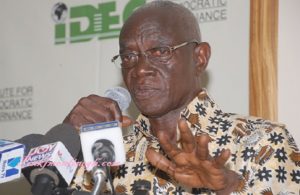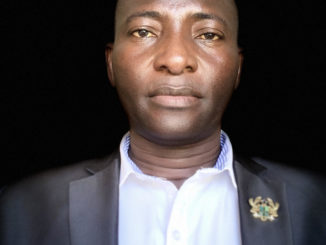 A past Chairman of the Electoral Commission (EC), Dr Kwadwo Afari-Gyan, has called for due diligence and deep thinking before the country goes ahead to register Ghanaians living abroad to vote in internal elections.
A past Chairman of the Electoral Commission (EC), Dr Kwadwo Afari-Gyan, has called for due diligence and deep thinking before the country goes ahead to register Ghanaians living abroad to vote in internal elections.
Parliament passed the Representation of People’s Amendment Law (ROPAL), 2006 (Act 699) to pave the way for Ghanaians in the Diaspora to be registered and allowed to vote in internal elections.
The EC is yet to fully implement the law.
In a lecture at the New Year School and Conference at the University of Ghana in Accra yesterday, Dr Afari-Gyan said given the complexity of the processes involved in opening the floodgate for Ghanaians abroad to vote, more work needed to be done to ensure that the move would not become counter-productive.
He was speaking on the topic: “Improving the electoral process for democratic consolidation.”
Diligence
Dr Afari-Gyan said, for instance, that there was the need to clearly determine whether Ghanaians in the Diaspora would vote by proxy, by mail or would be required to be present in person to cast their ballots.
In addition, he said, the question of whether Ghanaians in the Diaspora should be made to vote in all general elections in the country ought to be resolved.
“We need to know whether Ghanaians living abroad will vote in all elections in the country, how the voting will be done and how to track the system to ensure that the integrity of the process and results are not tampered with.
“It will be extremely difficult and cumbersome for the EC to process huge documents for all Ghanaians abroad to vote by proxy; voting by mail also means that there should be a robust tracking system to ensure that the process is not abused and also ensure that there is not much delay in results declaration,” he added.
Way to go
The former EC boss suggested that the way to go was to limit voting by Ghanaians abroad to only presidential elections.
He also advocated that Ghana’s foreign missions be used as polling centres for the elections.
“All Ghanaians living in all parts of the world cannot be registered and made to vote; if we insist that every Ghanaian must register and vote, it will be cumbersome and impracticable and so we should use our embassies and consulates for that purpose,” he said.
EC’s integrity
Touching on how to improve the electoral process for democratic consolidation, Dr Afari-Gyan said there was the need to take steps to make the EC stronger, truly independent and well resourced to deliver credible elections.
“We need an EC that will have officials who are impartial, transparent in their work, offer high quality electoral service and who will also have high ethical competence. We all make mistakes, but ethical competence will require that officials of the EC decide not to willingly do wrong,” he said.
Dr Afari-Gyan said the EC could improve on its core mandate to deliver an electoral process that would ensure easy access to electoral services.
He also urged the EC to take pragmatic steps to protect the secrecy and sanctity of votes.
He urged the commission to continue to leverage on technology to improve the electoral process but cautioned that such a regime must not turn out to complicate the electoral process.
He added that all stakeholders and citizens ought to get involved in the processes towards ensuring electoral reforms that would help consolidate the country’s democracy.
Dr Afari-Gyan called for steps to be taken to fund political parties to make them strong enough to participate in the electoral process to deepen democracy.
The Executive Director of the Institute for Democratic Governance (IDEG), Dr Emmanuel Akwetey, contributing to the topic, said all stakeholders in the electoral process, ought to commit to playing their roles well to consolidate the country’s democracy.
He said the EC’s role was critical, for which reason all impediments to the effective functioning of that institution ought to be removed.
He noted that no single body owned the electoral process and so all citizens must as well get involved to get credible election outcomes.
–
Graphic.com.gh



